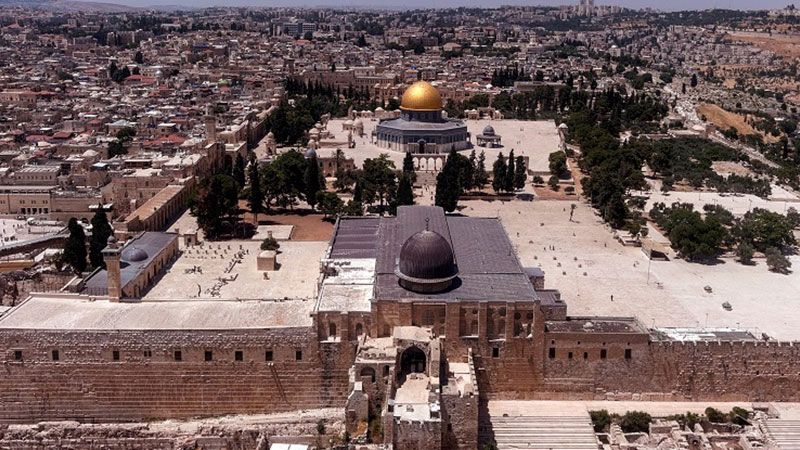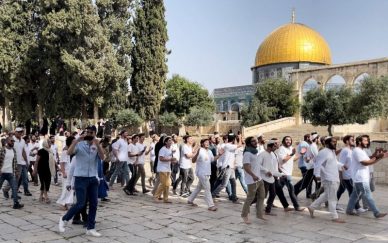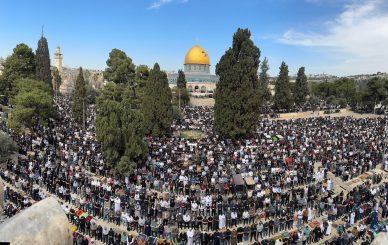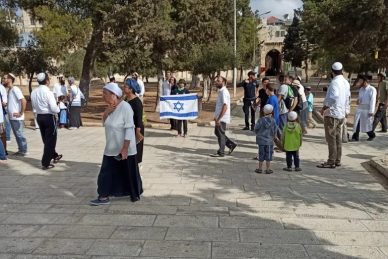OCCUPIED JERUSALEM, (PIC)
On December 6, 2017, then-US President Donald Trump declared the occupied city of Jerusalem as the capital of the Israeli occupation entity. In his famous announcement, he said, “We today finally acknowledge what is obvious: that Jerusalem is the capital of Israel. This is not more or less than a recognition of reality, but it is also the right thing to do. It is something that should be done.”
The name of Donald Trump casts a heavy shadow over the city of Jerusalem, given his poor record on this sensitive issue. Trump was the first American president to officially recognize Jerusalem as Israel’s capital and decided to implement the transfer of the US embassy from Tel Aviv to Jerusalem at the end of 2017, according to an article by writer and Jerusalem affairs specialist Abdullah Ma’aruf.
Although the Judaization of Jerusalem and the violation of the status quo at Al-Aqsa Mosque has been an old Israeli policy since the occupation of East Jerusalem in 1967, Trump’s announcement allowed Israel to further implement its racist plans and policies in the occupied city.
Ma’aruf continues: “Today, with Trump’s anticipated return to the White House, the grim picture represented by his first presidential term is once again overshadowing the atmosphere of the holy city, which is already clouded by the war that has been ongoing in the region for over a year, along with changes brought about by the years preceding the war regarding the Israeli government, which is now in the hands of the religious Zionism movement.”
According to Ma’aruf, Trump’s election and return to the White House primarily mean that the issue of Jerusalem will return to the forefront. From the beginning of the war, Trump has believed that the decision to end the current conflict should be in Netanyahu’s hands, who “must do what he has to do quickly,” as Trump put it.
Off the table
Ma’aruf discussed the centrality of the holy sites issue in Jerusalem within this conflict. Netanyahu’s and Trump’s strongest ally in Israel, the religious Zionism movement, views the issue of holy sites, particularly Al-Aqsa Mosque, as a fundamental principle that they cannot concede in their declared goal of establishing a Jewish temple at Al-Aqsa. There is nothing to suggest that Trump will not support this direction, especially after he placed Jerusalem “off the table,” as he said when he recognized Jerusalem as Israel’s capital in 2017.
Ma’aruf also reminded that Trump’s son-in-law, Jared Kushner, the architect of what was called the “Deal of the Century,” was one of the strongest advocates for the idea of opening Al-Aqsa Mosque “to all believers” to perform prayers, as he expressed. It goes without saying that this expression actually refers to opening Al-Aqsa specifically for Jewish prayers without restrictions. This is currently being carried out by leaders of the religious Zionism movement, led by Israeli extremist minister Ben Gvir and the occupation police, as a prelude to building a temple within the Mosque and gaining full control over it.
Furthermore, the Christian evangelical movement that currently controls the Republican Party in the United States is not far from these trends and demands. The extreme Christian cleric John Hagee, for example, is one of the voices openly calling for the construction of the Third Temple on the site of Al-Aqsa Mosque to facilitate the “second coming of Christ.” He is considered one of the most influential religious figures among the neoconservatives in the Republican Party and was frequently invited to the White House during Trump’s first term, enjoying significant support among the party’s base, according to Ma’aruf.
He continued, “Not only that, but Hagee also openly calls for the establishment of Greater Israel over the lands of Egypt, Jordan, Lebanon, Syria, Saudi Arabia, Iraq, and Kuwait, and he is unashamed in proclaiming the imminent realization of this in our current era.”
The specialist in Al-Aqsa affairs emphasized that the Palestinian people must prepare for a fierce wave of attempts to impose complete Israeli sovereignty over the holy city, Al-Aqsa itself, and even the entire West Bank, with the full support of the Trump administration.
He also urged preparation for the possibility that the Trump administration might escalate the conflict in the region rather than halt it. He pointed out that the coming days are laden with tremendous pressure aimed at implementing the agenda of these dangerous movements, unless there is at least a strong popular deterrent to confront this project, just as the people succeeded in thwarting the “Deal of the Century,” rendering the decision to recognize Jerusalem as Israel’s capital meaningless, and after they endured four major confrontations in Jerusalem and the Palestinian territories despite all efforts to suppress and intimidate popular will, whether from the occupation or its allies.
Greater momentum
In this context, writer and Israeli affairs expert Mohammed Halseh confirmed that during Trump’s new term, “we will witness an even greater momentum in relation to everything Arab and Islamic.” This momentum will particularly affect Jerusalem and the Israeli ambitions within it, as the right-wing government in Israel will align with the unleashed power of the right represented by Trump, the Republican Party, and Christian conservatives.
Halseh noted in press remarks that this will lead to the continuation of Israeli expansion in the region and the breaking of Arab and Muslim resolve amidst the weak, silent, and defeated Arab stance in the face of Israeli momentum.
According to the writer, “Over the course of more than a year of devastation in Gaza, Arabs have proven unable to impose a stance on Israel to at least stop the massacres it is committing. If Netanyahu and his right-wing decide to implement their agenda in the holy city, particularly concerning Al-Aqsa Mosque, Trump will not perceive a threat from the Arab and Islamic world; he has witnessed what transpired over the past year.”
The Jerusalem-based researcher and academic believes that “in the framework of the concessions that will occur between Trump and Netanyahu, it is possible that the latter will offer Trump a gift by halting the war, and in return, Trump will promise him privileges related to normalization with other countries, or the annexation of the West Bank, or making a qualitative leap regarding the issue of Al-Aqsa Mosque.”
Halseh predicts that Al-Aqsa will be at the eye of the storm, and Jerusalem will witness new violations because Trump will take every action that imposes the Israeli narrative. Any potential for Trump to reconsider—such as if US interests were threatened by Arab pressure—is absent, meaning he will not hesitate to state that Jews have a right to pray in a specific and independent area of Al-Aqsa Mosque, imposing spatial division at an official level.
He added, “No Arab regime will tell Trump no, and the movement of peoples in the Arab world is currently zero. Will Al-Aqsa be more valuable than the tens of thousands of lives lost before the cameras? Certainly not, unfortunately.”
He continued that during Trump’s new term, Al-Aqsa will be spatially divided. This announcement will not be limited to the pages of activists from the Temple groups; it may also be made officially, which would be considered a significant achievement for the ruling Israeli right. Changes on the ground could be implemented by carving out space through the installation of barriers and partitions, similar to what was imposed at the Ibrahimi Mosque in Al Khalil.














